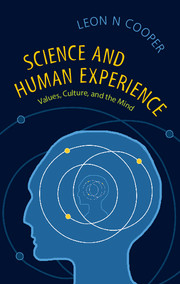Book contents
- Frontmatter
- Dedication
- Contents
- Preface
- Acknowledgement
- Part One Science and Society
- 1 Science and Human Experience: (Mephistopheles Is Alive and Well and Living in the Space Age)
- 2 Does Science Undermine our Values?
- 3 Can Science Serve Mankind?
- 4 Modern Science and Contemporary Discomfort: Metaphor and Reality
- 5 Faith and Science
- 6 Art and Science
- 7 Fraud in Science
- 8 Why Study Science? The Keys to the Cathedral
- 9 Is Evolution a Theory? A Modest Proposal
- 10 The Silence of the Second
- 11 Introduction to Copenhagen
- 12 The Unpaid Debt
- Part Two Thought and Consciousness
- Part Three On the Nature and Limits of Science
9 - Is Evolution a Theory? A Modest Proposal
from Part One - Science and Society
Published online by Cambridge University Press: 05 November 2014
- Frontmatter
- Dedication
- Contents
- Preface
- Acknowledgement
- Part One Science and Society
- 1 Science and Human Experience: (Mephistopheles Is Alive and Well and Living in the Space Age)
- 2 Does Science Undermine our Values?
- 3 Can Science Serve Mankind?
- 4 Modern Science and Contemporary Discomfort: Metaphor and Reality
- 5 Faith and Science
- 6 Art and Science
- 7 Fraud in Science
- 8 Why Study Science? The Keys to the Cathedral
- 9 Is Evolution a Theory? A Modest Proposal
- 10 The Silence of the Second
- 11 Introduction to Copenhagen
- 12 The Unpaid Debt
- Part Two Thought and Consciousness
- Part Three On the Nature and Limits of Science
Summary
Critics of Darwinian evolution assert that it is “only a theory.” But what is a theory? And is intelligent design a theory that is a credible alternative to Darwinian theory? Why do we refuse to discuss the ongoing debate in the science classroom?
Since I am a card-carrying member of the scientific establishment, and might possibly be accepted as one of the “Eastern Intellectual Elite,” my position on the current, somewhat astonishing “debate” on the teaching of evolution should be as predictable as the orbit of Mars calculated according to Newtonian physics. And it probably is. But today, we are quantum physicists; there may be a degree of uncertainty or unpredictability in our positions.
If Darwinian evolution is not a theory what could it be? It was proposed by Darwin as an explanation for an astonishing variety of facts concerning the interrelatedness of the many species now existent as well as the origins of these species and the evolution of life on Earth. It explains anatomical progressions, DNA, protein and other chemical similarities between different species.
It is one of the more remarkable theoretical structures created by the human mind; Darwin's evolution stands with the great theories of the physical world: remarkable structures that explain and connect vast varieties of phenomena – from the behavior of electrons at the lowest temperatures to the origin of the matter in the fiery instants after the creation of our present universe in what is called the Big Bang.
- Type
- Chapter
- Information
- Science and Human ExperienceValues, Culture, and the Mind, pp. 70 - 72Publisher: Cambridge University PressPrint publication year: 2014



